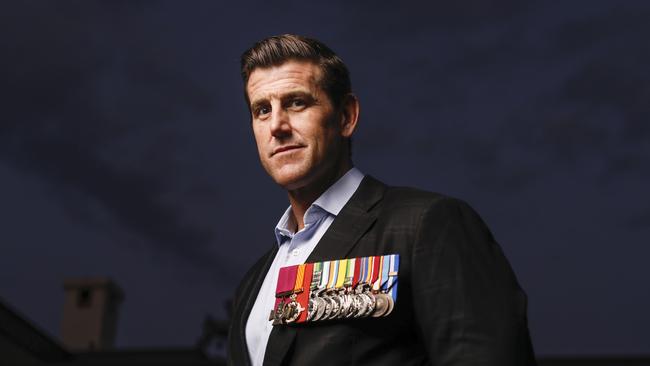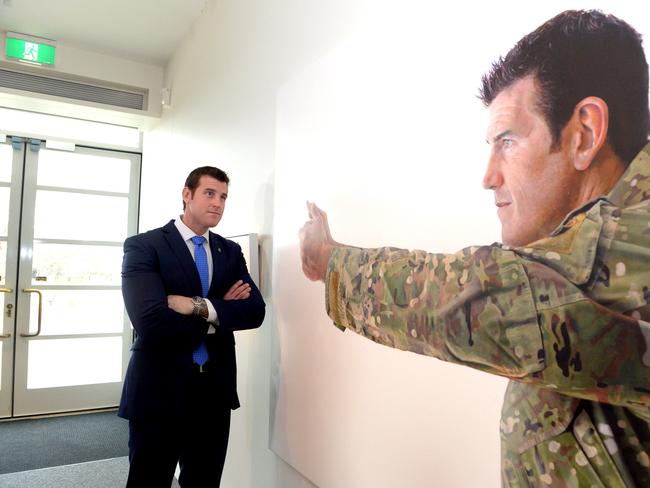AFP has eyewitnesses to alleged Ben Roberts-Smith war crimes, court hears
The AFP has eyewitness accounts of alleged war crimes in which decorated soldier Ben Roberts-Smith is a suspect, a court has heard.

The Australian Federal Police wrote to Ben Roberts-Smith’s lawyer to say it had eyewitness accounts of alleged war crimes in which the decorated soldier is a suspect, a court has heard.
Details of the letter were revealed in a hearing on Tuesday, as the Australian Defence Force fights to stop the release of a notice from its top secret inquiry into alleged war crimes in Afghanistan.
The notice, which Mr Roberts-Smith may or may not have received, potentially advises if he faces damning findings from the inquiry.
Mr Roberts-Smith, who has received the Victoria Cross, is suing The Sydney Morning Herald and The Age over investigative reports he claims painted him as a murderous war criminal during his time as a Special Air Service soldier in Afghanistan between 2009 and 2012.
He strongly denies any wrongdoing.
Sandy Dawson SC, acting for the newspapers, told the court the soldier had a private interest in preventing disclosure of any notice he has received and it suggested “there is something he doesn’t want us to see”.
Mr Dawson told the court there were three processes on foot that “plainly overlap”: the defamation case, the ADF inquiry into alleged war crimes, and an AFP investigation into Mr Roberts-Smith.
Mr Dawson said the AFP wrote to Mr Roberts-Smith’s solicitor confirming he was a suspect in two war crimes: the alleged cruel treatment and murder of Ali Jan, an Afghani man who was killed in Uruzgan province in 2012.
The newspapers allege Mr Roberts-Smith kicked Mr Jan off a cliff when he was handcuffed, before the Afghani man was allegedly shot.
The letter stated the AFP had eyewitness accounts to contradict Mr Roberts-Smith’s account that Mr Jan was a Taliban informant and “legitimately killed”.
The AFP had made inquiries in Afghanistan and spoken to a number of current and former personnel, the court heard.
Mr Roberts-Smith was invited to an interview, and told the AFP investigation began in June 2018 on referral from then ADF chief Mark Biskin.

As part of the defamation case, the newspapers have requested Mr Roberts-Smith hand over, if he has received one, a notice informing him he is a potentially affected person (PAP) in the ADF inquiry.
But the ADF has moved to block Mr Roberts-Smith from responding to the request, even to confirm or deny if he has received a notice, on public interest immunity grounds.
A PAP notice advises the recipient of any proposed recommendations or findings arising from the inquiry that may affect them.
Barrister Anna Mitchelmore SC, representing the ADF inspector-general, argued in the Federal Court on Tuesday that forcing Mr Roberts-Smith to reveal whether or not he had received a PAP notice could prejudice the inquiry by discouraging whistleblowers from coming forward.
The secretive nature of the inquiry and confidentiality assurances given to witnesses has meant they could raise “with frankness and candour” matters that they may have otherwise “kept to themselves”, Ms Mitchelmore said.
She argued requiring Mr Roberts-Smith to disclose if he had received a PAP notice would “create a very real risk” witnesses would stop co-operating, and prospective ones would conclude “it’s not worth it”.
But Mr Dawson contended it would have the opposite effect.
“You don’t tell the truth about what happened in Afghanistan as a current or former SAS operative if you don’t expect something to be done,” he said.
“Far from it being something that would imperil the public interest in people coming forward and telling their story, it would promote that object.”
Mr Dawson also argued witnesses at the inquiry could not possibly have been given an assurance that their evidence, not just their identity, would remain confidential.
Mr Roberts-Smith supports the ADF position, but his lawyer made no submissions in court.
Mr Dawson suggested the soldier has a private interest in preventing the disclosure.
“It rather tends to suggest that’s what there is something he doesn’t want us to see,” he said.
The ADF inquiry is ongoing, but may conclude in the coming months, and not everyone who will get a PAP notice has already received it, the court heard.
Mr Dawson pointed out that the inquiry was called to investigate “damaging” and “pervasive” rumours, and that the fact that PAP notices were being distributed at all showed the inquiry had uncovered conduct that was “at least” the subject of proposed recommendations or findings.
Mr Dawson said the AFP had agreed to hand over about 320 documents, some of which contained national security information.
These would be dealt with under the strict information regime agreed by parties in the defamation case, which includes laptops that cannot connect to the internet stored in safes and other security measures.
“The issues are not without their complexity,” Justice Colvin said at the end of the hearing.
He has reserved his decision.


